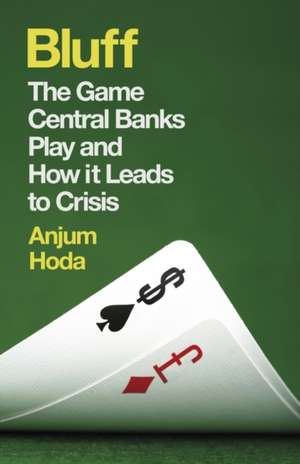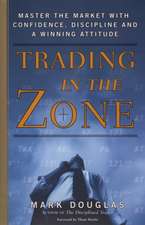Bluff: The Game Central Banks Play and How It Leads to Crisis
Autor Anjum Hodaen Limba Engleză Paperback – 12 iul 2016
"A financial cri de coeur from a banking insider.... Sound post-Keynesian economic reasoning well argued—a book that one hopes, against the odds, the heads of the Federal Reserve and the Bank of England will entertain."
— Kirkus Reviews
"This is an interesting take on the causes of financial crashes."
—Publishers Weekly
The accepted narrative of the global financial crisis of 2007–09 is that the central banks saved us from an inferno caused by Wall Street greed. While there is no doubt they did save us, did the firefighters actually cause the fire?
The Bank of England and U.S. Federal Reserve have used the bait of low interest rates together with the bite of inflation in their quest for economic growth. Bluff reveals how these tactics have failed and instead left us with an unhealthy mix of debt, alternating booms in real estate and equity markets and laggard wages.
In an incisive critique, Bluff makes the case for a much-needed public debate on the role of the all-powerful central banks; an acknowledgment of the damage caused by flawed policy decisions; and a vital reassessment of the social contract between the people and their central bank.
— Kirkus Reviews
"This is an interesting take on the causes of financial crashes."
—Publishers Weekly
The accepted narrative of the global financial crisis of 2007–09 is that the central banks saved us from an inferno caused by Wall Street greed. While there is no doubt they did save us, did the firefighters actually cause the fire?
The Bank of England and U.S. Federal Reserve have used the bait of low interest rates together with the bite of inflation in their quest for economic growth. Bluff reveals how these tactics have failed and instead left us with an unhealthy mix of debt, alternating booms in real estate and equity markets and laggard wages.
In an incisive critique, Bluff makes the case for a much-needed public debate on the role of the all-powerful central banks; an acknowledgment of the damage caused by flawed policy decisions; and a vital reassessment of the social contract between the people and their central bank.
Preț: 95.80 lei
Nou
Puncte Express: 144
Preț estimativ în valută:
18.34€ • 19.92$ • 15.41£
18.34€ • 19.92$ • 15.41£
Carte disponibilă
Livrare economică 01-15 aprilie
Preluare comenzi: 021 569.72.76
Specificații
ISBN-13: 9781780748139
ISBN-10: 1780748132
Pagini: 336
Dimensiuni: 146 x 226 x 23 mm
Greutate: 0.34 kg
Editura: Oneworld Publications
Colecția Oneworld Publications
Locul publicării:United Kingdom
ISBN-10: 1780748132
Pagini: 336
Dimensiuni: 146 x 226 x 23 mm
Greutate: 0.34 kg
Editura: Oneworld Publications
Colecția Oneworld Publications
Locul publicării:United Kingdom
Recenzii
"Hoda, an erstwhile derivatives trader with J.P. Morgan and Swiss Re, among other houses too big to fail, offers a variation on the trope that the last great financial crisis was the product of 'the greed and deceit of commercial and investment bankers and traders.' There was that, to be sure, but the instability that has followed suggests, she argues, that a more complete truth lies elsewhere. She locates this in the complex interplay of central banks with the larger financial world, serving up a program that encourages investors to borrow even if it leads to more debt, 'trying to create economic momentum by intimidating people with a continued reduction in purchasing power.' Tied up in this is an oddly tilted, sometimes paradoxical system that punishes thrift—because too much thrift leads to impoverishment in an economy premised on consumer spending—by lowering interest rates below that of inflation, 'effectively taxing our savings.' In a sense, the banks’ bluff is that the game can continue even as people realize that it’s rigged.
Hoda examines the evolution of central banks over a long, bumpy history of previous financial panics, offering sidelights on the abandonment of the gold standard. Of more immediate interest is her take on the difficulty of investing in such a climate of uncertainty, with the real winners being the traders who 'aim to extract value by anticipating the actions of the central banks.'
Writing accessibly and without undue reliance on jargon, Hoda dissects efforts at regulating the financial industry, such as the Dodd-Frank Act, which she considers one that 'confused correlation with causality,' and advocates for zero inflation, job creation, and other stability-improving policies. On the present course, writes the author in closing, 'investors will stop believing the central banks, even when they should.'
Sound post-Keynesian economic reasoning well argued—a book that one hopes, against the odds, the heads of the Federal Reserve and the Bank of England will entertain.
—Kirkus Reviews
"This is an interesting take on the causes of financial crashes."
—Publishers Weekly
Hoda examines the evolution of central banks over a long, bumpy history of previous financial panics, offering sidelights on the abandonment of the gold standard. Of more immediate interest is her take on the difficulty of investing in such a climate of uncertainty, with the real winners being the traders who 'aim to extract value by anticipating the actions of the central banks.'
Writing accessibly and without undue reliance on jargon, Hoda dissects efforts at regulating the financial industry, such as the Dodd-Frank Act, which she considers one that 'confused correlation with causality,' and advocates for zero inflation, job creation, and other stability-improving policies. On the present course, writes the author in closing, 'investors will stop believing the central banks, even when they should.'
Sound post-Keynesian economic reasoning well argued—a book that one hopes, against the odds, the heads of the Federal Reserve and the Bank of England will entertain.
—Kirkus Reviews
"This is an interesting take on the causes of financial crashes."
—Publishers Weekly
Notă biografică
Anjum Hoda has worked for nearly two decades as a fixed income portfolio manager, derivatives trader and strategist at JP Morgan, Standard Chartered and Swiss Re. She continues to work in asset management and currently runs Macrantha Capital Advisory. She lives in London.
Descriere
"A financial cri de coeur from a banking insider.... Sound post-Keynesian economic reasoning well argued—a book that one hopes, against the odds, the heads of the Federal Reserve and the Bank of England will entertain."
— Kirkus Reviews
"This is an interesting take on the causes of financial crashes."
—Publishers Weekly
The accepted narrative of the global financial crisis of 2007–09 is that the central banks saved us from an inferno caused by Wall Street greed. While there is no doubt they did save us, did the firefighters actually cause the fire?
The Bank of England and U.S. Federal Reserve have used the bait of low interest rates together with the bite of inflation in their quest for economic growth. Bluff reveals how these tactics have failed and instead left us with an unhealthy mix of debt, alternating booms in real estate and equity markets and laggard wages.
In an incisive critique, Bluff makes the case for a much-needed public debate on the role of the all-powerful central banks; an acknowledgment of the damage caused by flawed policy decisions; and a vital reassessment of the social contract between the people and their central bank.
— Kirkus Reviews
"This is an interesting take on the causes of financial crashes."
—Publishers Weekly
The accepted narrative of the global financial crisis of 2007–09 is that the central banks saved us from an inferno caused by Wall Street greed. While there is no doubt they did save us, did the firefighters actually cause the fire?
The Bank of England and U.S. Federal Reserve have used the bait of low interest rates together with the bite of inflation in their quest for economic growth. Bluff reveals how these tactics have failed and instead left us with an unhealthy mix of debt, alternating booms in real estate and equity markets and laggard wages.
In an incisive critique, Bluff makes the case for a much-needed public debate on the role of the all-powerful central banks; an acknowledgment of the damage caused by flawed policy decisions; and a vital reassessment of the social contract between the people and their central bank.

